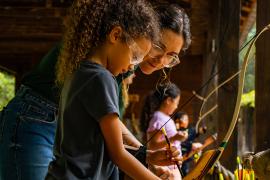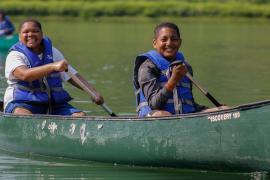The “fun” started on the very first day of camp. I was helping some of my 10-year-old boys put their belongings into their respective cubbies when I turned to help a youngster we’ll call “Jake.” As I lifted the top portion of his trunk, I found an assortment of firecrackers and cherry bombs. “What!” I exclaimed. “You can’t have these here!”
Jake tried to grab them away, saying, “They’re for the Fourth of July!”
“Not here, they’re not!”
Jake spent the next four weeks disappearing during rest hour, pantomiming the various motions of human reproduction with his pillow, and alternately delighting, appalling, and terrifying his cabinmates. He was a young man who definitely knew how to get the attention of his peers, but not necessarily in ways that actually built trusting friendships. I spent the summer taking Jake aside for little chats and time outs. On days when his behavior was especially provocative or disruptive, I would row him out in a pram off the sailing dock, within sight of other boats and staff members but with enough privacy to talk with him one more time about how he could save himself from being sent home.
Suffice it to say we both survived that summer. I loved that kid in spite of all the rock-throwing and swearing incidents. After he returned home I got a letter (there was no email in those days) from his parents thanking me for returning to them a child that, at least for a few weeks, they didn’t recognize. “He makes his bed — sort of — each morning, is nice to his sister, and even half-heartedly does his homework after school!”
What I did not have the words for at the time was that Jake and I were engaged in helping him learn how to gain control over his impulses — to self-regulate and therefore be better able to be a welcome part of our camp community. Without realizing it I was helping Jake take the first steps toward developing a positive “moral” character. About 20 years later, after email had been invented, Jake reached out to me and told me he had never forgotten how patient, kind, and helpful I had been to him that summer. He was expressing deep gratitude, what I personally consider to be one of the most essential character traits an individual can curate.
Defining Character
Character is the capacity for speaking or behaving in ways that can be recognized universally as a trait and that defines how we as individuals relate to others. For character to be authentic — something we build a capacity for — the way in which we act externally must match what we experience internally. It is this connection between one’s inner experience and outer behavior that qualifies character as a capacity, or behaviors that are deeply ingrained within us. Otherwise, we could go through the motions of being kind, for example, without actually coming from a place of kindness in ourselves. To do so would be acting, which might be somewhat convincing in the short term, but would not stand the test of time. Character traits are enduring.
“Character” is more than just a set of skills. To be sure, all character traits, such as kindness, gratitude, integrity, or resilience, have skills associated with them, like being good at noticing the needs, emotions, or contributions of others; or being able to delay our own gratification or control our tempers. Character is also different from personality. While there is some overlap between what someone’s personality is and what their character is, personality refers to aspects of a person, such as their wit or sense of humor, their likes and dislikes, or their idiosyncratic quirks, temperament, and so on. Many people confuse these two dimensions of human behavior. To have character means to live by a code of conduct that serves as both a guide and a restraint — a way of walking through the world that comes from within rather than being imposed from without. Character is what saves us from our worst impulses and allows us to get along with and make meaningful contributions to the welfare of our families and our communities. Character is what makes us civilized.
Character Is Universal
The definition of character I am proposing is one that is universal — one that transcends any one religion, belief system, or organization. That is because character traits are not, in and of themselves, religious, political, or even philosophical. While many character traits —like service to others, kindness, or gratitude — are and have been promoted and reinforced by various religions or philosophies, when we refer to “character,” it should be in a way that does not exclude anyone whose beliefs do not align with any particular movement or religion. After all, a person can be a member of any religious group, any political party, or aligned with any philosophy (or none at all) and still be kind, generous, have integrity, or be resilient.
Character traits are not innate. They must be cultivated. Character development is part of human development. Every individual builds their capacity for acting in certain characteristic ways. Those ways of behaving can be positive or negative depending on the influences in each person’s formative experiences. My focus is on positive character, or what David Brooks and others call “moral character”; which is to say, the traits or values that allow us as a species to coexist or to have civilization — a society where individuals can get along, share experience, and overcome being threatened by one another’s identities or beliefs (Brooks, 2016).
In that respect, no one “owns” the concept of character or any one particular character trait. Having a universal definition of character better serves the camp and youth movements, because camps in particular work with children from such a wide range of backgrounds. It makes no difference whether or not a camp is religiously oriented, nonprofit, or privately owned. It also doesn’t matter if it is a sleepaway or day camp. Each of these youth-serving programs can be equally effective at helping youngsters develop assets like kindness, gratitude, integrity, resilience, and so on. What may be different from organization to organization are the particular character traits any given program endorses or values and the way in which each program fosters those character traits. As the saying goes, many roads lead to Rome!
The Four Character Superpowers
When I talk with kids about their character, I call it their “hidden superpower.” From my experience with young people, both at camp as well as in my own psychotherapy practice, I have identified four character traits that I believe are central to young people’s growth and success. Those four strengths are:
- Resilience
- Kindness
- Gratitude
- Integrity
Let’s look at them one at a time.
Resilience
Resilience encompasses what some people call “grit” and others call “perseverance.” To be resilient means that we have the capacity for two important things:
To keep going (persevere) in the face of adversity. Persevering requires us to tolerate our frustration, bind our anxiety, and overcome our fears or other impediments or “negative self-talk” and develop “positive self-talk” — the things we say to ourselves when we want to keep going. Persevering requires us to temper our pride and allow ourselves to look for and accept help in the pursuit of a goal or challenge.
To recover from a setback. We all have times when we make a mistake, don’t do well on a test, don’t get that job or into that program. There will always be a time when we are excluded from a group or are experiencing the breakup of a friendship or love relationship. Life is full of such setbacks. Resilience means we are able to keep our egos in check and overcome whatever sadness, guilt, or shame we might have about it. It means taking the time to identify and allow our negative feelings of rejection or disappointment, and then picking ourselves back up, moving on, and learning from the experience as best we can.
Kindness
Being kind requires that we give of ourselves — that each of us overcome whatever discomfort the situation might involve and give of our time, our attention, or other personal resources. It means being a good listener and having a deep concern for the welfare of others. One of the reasons I see kindness as one of the four core character superpowers is that it gets us out of our heads — our worries, struggles, uncertainties, or misgivings — and gives us the space to be mindful of others and contribute to our community’s welfare. In that regard it has a powerful positive effect, both on the person receiving and the person who is giving. In its best form, kindness comes without a hidden agenda. That is, we offer our time and other resources because we simply want to contribute to the well-being of others, and by extension, of the group or wider community. That is because kindness is contagious. Research has shown that when we observe others being kind, we experience joy and are more likely to engage in an act of kindness ourselves (The Be Kind People Project, n.d.).
When camp staff engage with their kids in meaningful ways and give them their time and attention, they are coincidentally exhibiting and modeling kindness. It means comforting kids who are homesick or struggling to make friends. It means taking campers aside and addressing their misbehavior in respectful and helpful ways rather than shaming or threatening them. And because we know that kindness begets kindness, by the way they interact with their kids, counselors have an opportunity to create a culture of kindness in their cabins or groups by being good role models.
Gratitude
Gratitude is central to many other capacities we develop as human beings, such as empathy, kindness, and meaningful connection to others. Being grateful also helps us let go of our worries and uncertainties, because it focuses on the positive. To be grateful means to recognize the gifts we have been given, whether by our parents, our friends, our community, or the universe (our DNA, our opportunities, our abundance). It requires us to overcome our pride and be humble in the face of acknowledging that we are not perfect but improved by the acknowledgement of all that supports us and contributes to our happiness and well-being.
Like kindness, leadership and staff can also model gratitude. And like showing kindness, expressing gratitude can be contagious. It helps gather people into a more positive mindset, which can contribute to all the other core character strengths, such as resilience (it adds to our positive self-talk) and integrity (it helps us honor the gifts we’ve been given).
Integrity
Integrity is one of the most important qualities or capacities we can develop in ourselves and others. To me it is a master character strength, because it means being our best self as much as humanly possible in any given situation. Integrity is a higher-ordered capacity as it comes from a more altruistic mindset. To have integrity means that we have the capacity for four important things:
To take responsibility for the impact of our words and actions — what we do and say — regardless of what our positive intentions may have been. Taking responsibility in this way requires that we once again overcome our pride and have a willingness to look at things from a perspective that is totally different from our own (perspective taking).
To keep our word. To have integrity means that we make good on our promises. It means that what we commit to and what we say we will do, we actually put into action. Simply put, it means our words and deeds match. It means we don’t just “talk the talk,” but we “walk the walk.”
To keep confidences. When others trust us with their private concerns, we carry that trust in an almost sacred way. Keeping that trust means overcoming the temptation to spill to others, which might make us popular in the moment but would destroy any integrity we had. Keeping a confidence is part of what it means to “do the right thing,” especially when it would be less emotional work or more fun not to.
To do and say what is right rather than what might feel good in the moment. Many of us make decisions or do things based on what makes us “feel good.” Having integrity means subduing our own appetites or selfishness in the service of others. It means not taking advantage of our positions of power (our relative wealth, fame, position, status, role) to use others for our own pleasure, satisfaction, or personal gain. Unfortunately, we hear all too often about adults in a position of power taking improper sexual advantage of those in their care. I often say to camp counselors that they are entering a sacred space with their campers. They are being entrusted with the care and well-being of imperfect, impulsive, messy, noisy, nosey, dependent, young, evolving beings over whom they have extraordinary influence. To have integrity means taking this trust and this sacred space seriously.
These four character traits — resilience, kindness, gratitude, and integrity — are only my choices. You or your youth-serving organization may have others that you deem more important, such as curiosity, optimism, honesty, or loyalty. As I have pointed out, no one owns character. There are as many ways to help young people develop various character strengths or assets as there are youth enrichment programs. Camps have an especially great opportunity to help young people of all ages — children and staff alike — develop positive character strengths.
Photo courtesy of Outpost Summer Camps, Poway, CA.
References
The Be Kind People Project. (n.d.). The science of kindness. thebekindpeopleproject.org/blog/2024/11/13/the-science-of-kindness
Brooks, D. (2016). The road to character. New York, NY: Random House.
Portions of this article have been reprinted from the new book by Jim Cain and Bob Ditter, Building Character at Camp, with permission from Healthy Learning.
Bob Ditter is a highly respected adolescent and family therapist in Boston who has worked extensively with youth-serving organizations throughout the United States. Bob took a special interest in children’s summer camps beginning in 1981 and has conducted leadership training, staff orientation, and onsite visits to over 600 camps throughout the US and Canada. He is best known for his Camping Magazine “In the Trenches” column, which dealt with the practical issues facing camp professionals, and his many training videos. Sports Illustrated named him “camping’s most articulate spokesperson.” He has appeared on NBC’s TODAY Show twice, Good Morning America, and the ABC Evening News, and has been quoted in The New York Times, The Boston Globe, The Ladies Home Journal, Parents Magazine, and Money Magazine, to name just a few. Bob retired from his camp-related work in 2020 to concentrate on his psychotherapy practice with young people. His coauthored book, Building Character at Camp, is available through the ACA Bookstore.




